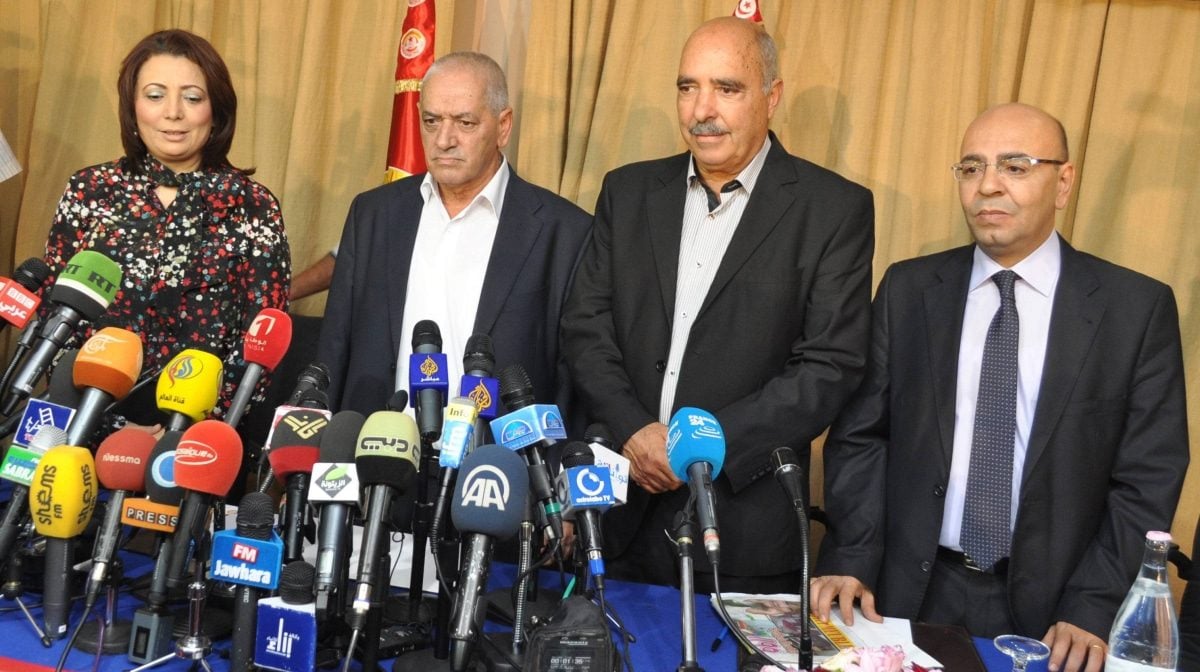
The 2015 Nobel Prize was awarded to the Tunisian National Dialogue Quartet. It is the first Tunisian Nobel Prize and the first fortunate story to come out of Tunisia in 2015. It won’t hide Tunisia’s deep problems and uncertain future, but it is a foundation that the country’s policymakers, civil society, and the international community should build on in order to give Tunisia’s people and investors the needed positive reinforcement.
When the prize was announced, many wondered what the “Quartet” was. In fact, even when the Quartet began operating in 2013, people were unsure what it was. It had no official mandate, no clear structure, not even an office where it could arrange meetings and plan its work. The Quartet was an ad hoc group of civil-society organizations that functioned effectively and delivered results.
The Quartet consisted of Tunisia’s main, and earliest, labour union (UGTT), its main employers’ union (UTICA), the country’s historic human-rights organization (LTDH), and its lawyers’ association (ONAT). UGTT has the power of street mobilization coupled with a revolutionary legitimacy, UTICA is strong in the wealth of its members, LTDH has a history of defending human rights, and ONAT is credited with fighting dictatorship in order to establish the rule of law.
Led by UGTT and UTICA, the four organizations have held a series of meetings with political leaders and civil-society organizations with the aim of tamping down the country’s polarization (Islamists vs. secularists). It was tense and risky, but it allowed for a smooth transfer of power between the Islamist Ennahda Party and an independent government in January 2014, as well as the ratification of Tunisia’s second modern constitution. It also paved the way for the successful elections of 2014.
The Quartet had plans to duplicate the national political dialogue in the field of economics. Tunisia has been suffering from an acute economic crisis that set in motion the revolution of 2010-11 but turned worse in its aftermath. That economic dialogue never materialized: it was an unfinished job that no one took over. The Quartet’s role was gradually marginalized by subsequent events.
Tunisia’s economy is in a state of disarray, and most experts predict a gloomy future if reforms are not undertaken—these reforms are lagging. Some even think that it is already too late, and worrisome news keeps coming, week after week. Corruption goes hand in hand with the economic crisis, and the informal economy is gaining ground; a ponderous bureaucracy makes things worse.
Politics is only a temporary problem, compared to Tunisia’s long-term economic difficulties. Politics was the tip of the iceberg: solving the political crisis was an opportunity to move forward, but it did not improve the daily lives of Tunisians. On the contrary, it raised their expectations, as many thought that the newly elected government would increase salaries and create a boom in the job market. A year later, they’re intensely disappointed.
The Quartet leaders (UGTT and UTICA) have their differences. Their perennial war did take a break in 2013 but resumed immediately after the political crisis was resolved in 2014, in both economics and politics. To summarize the conflict, UGTT wants an increase in workers’ wages and more social and legal protection by the state, while UTICA opposes that approach and pushes for more economic liberalization and for maximizing the power of the business community.
The economic situation has been worsening in 2015, as a consequence of the two terrorist attacks, at Bardo and Sousse, which led to the collapse of the tourism industry. Tens of thousands of Tunisians lost their jobs, and foreign currency reserves fell. This is a vicious cycle: terrorism begets economic crises, and economic crises produce terrorism.
Extremism has been on the rise since the revolution, and its terrorist actions have taken various forms. After concentrating on limited military targets between 2011 and 2014, the phenomenon spread to civilian sites, as witnessed by the spectacular attacks in 2015. While still limited, terrorism affected both the psyche of the Tunisian people and the international perception of Tunisia. The fact that thousands of Tunisians joined the Islamic State now plagues Tunisia’s reputation abroad.
And suddenly came the Nobel Prize. It was followed by the International Crisis Group’s annual award that was made to Tunisia’s president Beji Caid Essebsi and Ennahda’s president, Rached Ghannouchi. Then came NDI’s Democracy Award, which was also delivered to a group of Tunisian policymakers and civil-society activists. The last quarter of 2015 sent Tunisia back into the limelight, partially restoring its image to the glory it enjoyed in 2011.


